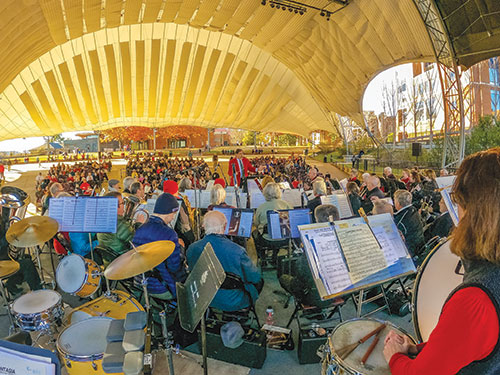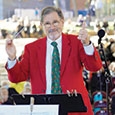Stephen Layman came to Charlottesville after earning degrees from the University of Kentucky and Ohio Northern University. His teaching career has included stints directing at the middle school, high school, and collegiate levels, including 22 years at Western Albemarle High School. For more information, visit cvilleband.org.
.jpg)
Layman has heard from several local residents who have picked up their instruments again during the pandemic and want to reconnect with music by joining the band. The band membership typically includes 90 people with ages ranging from high school to players in their early 80s. The current group includes five current or retired band directors, former members of military bands in DC, teachers, doctors, lawyers, and many others. Layman recently discussed the band’s enduring legacy of bringing people together.
What are the commissions you will perform in honor of the band’s anniversary?
We promoted a contest that invited folks to submit a one-minute fanfare. We have four excellent fanfares that we will unveil over the summer concert schedule. Composer Paul Murtha has also written The Cville Centennial, a work that we are excited about. We play a fair number of his pieces because he just writes so well for symphonic band. When the band members voted on who we should ask to write a piece for us, Paul was the answer.
What is the typical balance of musical styles for your concerts?
We probably play about 25% patriotic music and marches; 25% pop, rock, and jazz; 25% music originally written for concert band; and the rest transcriptions. In 2021, we had so little rehearsal time before our summer season that we backed off transcriptions and symphonic band literature to focus on light classical and popular music. This year we want to get back to our standard mix of repertoire.
How do you view the band’s role in entertaining and educating the public and the musicians?
The band was formed in 1922 after the President of the University of Virginia traveled to Richmond to lobby to keep the medical school in Charlottesville instead of moving it to Richmond. When he returned, local business leaders were standing on the bridge above the railroad station bemoaning the lack of a decent band for celebrations. Although that was our initial role, we eventually moved to a concert band format.
I see us as a group to entertain. We love the summer concerts where families come out with a blanket and listen to the music while the little kids play. We perform music that a variety of ages will enjoy. I also like to do some education. Sometimes as we present a piece, I may talk about the form or the why of what they are going to hear. The high school director in me wants to cover as many bases as possible.
How are high school students added to the band?
I used to pull kids from my high school band all the time because the Tuesday night rehearsals were a great way for them to gain experience. Now, so many high school students are taking four or five AP classes that they don’t have 90 minutes to spare on a weeknight. Some of those kids are up until midnight working on homework.
In April, I contact all of the local high school directors and ask for recommendations of juniors and seniors, particularly those who are thinking about going into music in some professional way, who might be interested. We perform about 90 pieces a year, which is great experience for students considering a career in music.
We bring them in during May so they get at least four rehearsals under their belt before our summer season. I have been excited this year because when we came back for our winter holiday concert, four of our summer high school players wanted to play, which usually isn’t the case. They do not often have time, but because of the limits on high school bands during the pandemic, they really wanted to take advantage of the opportunity.
What is the greatest non-musical challenge in leading the group?
The most important thing is just keeping everybody wanting to come back the next week. In a group where everyone is a volunteer, if they are not happy, they won’t return. I try to challenge people, keep the rehearsals fun and light, and give them the opportunity to excel and share their music with the public.
Who were some of the most memorable players that you have had over the years?
There are so many, but one who stands out from the 1980s was Louis Greenspan, who at one time was the first clarinetist in the U.S. Army Band. He played under William Revelli when he was still teaching high school in Indiana. Louis had so many stories and was also a master musician. He would take just about anybody under his wing and help them become a better player.
It is also gratifying that we have a number of published composers in the band, including Gary Fagan, Charles Torian, and Fred O’Bryant who I consider really great composers. They love to write for the group because they get to hear their music before it goes to the publisher.
Did anyone inspire your career in music?
My high school band director played in Gene Krupa’s band as a sax player. I went to a Catholic high school and switched from horn to trumpet when I began playing in jazz band. He started us out with a jazz format, which I really enjoyed. I don’t think I played a Sousa march until I was in college. If I wanted to take home a saxophone or a flute for the weekend, my director never objected.
By my junior year, we had a seven-piece big band, and he helped us get weekend gigs at VFW halls and other venues. That band provided us with great experience along with money to pay for gas and car expenses. I always thought I wanted to be an engineer but advanced math tripped me up. My high school guidance counselor suggested that I reconsider engineering and go into something I felt really comfortable with. That was music.
When I attended graduate school at the University of Kentucky, I became the graduate assistant for Rex Connor, a well-known tuba player in the 1970s, for a couple of years. He was nearing the end of his career and wanted someone to take over his studio one year so that he could go on sabbatical, and then the other year I got to work with him. When I graduated from Kentucky, I had various options to consider. My wife had gone to school in Virginia and suggested that I take a look there.
There was an opening in Charlottesville, and the music supervisor there was Jim Simmons, who was also the assistant director of what was then called the Municipal Band. He mentioned that if I came to teach there I was welcome to play in what was considered a good town band.

How is the band funded?
Until 2014 we were incorporated as a city band and funded completely by the city. In 2014, the city changed its approach to arts funding, and they basically reduced the funding to zero. After pondering various fundraising options, an angel donor made a $500,000 matching grant. In less than a year, members of the community matched the donation, and we now have a $1 million endowment that I hope will fund us far past my lifetime or the lifetime of anyone in the band.
Having taught and conducted over so many years, what are you still trying to improve?
There is so much new music, but also old music that I love. I have to be careful to pull some new music into my repertoire each year. It is easy to stick to the old war-horses. Some of the newer works are way out there, and others represent the next step in the development of the symphonic band. I want our players to hear and perform this exciting music.
Aside from the high school players in your group, are there other ways that the band supports local music education?
We have an annual scholarship where students audition for a chance to play a solo with a band at the spring concert and receive a $1,000 scholarship, although we have discussed raising it to $2,000. We need to spend a bit of our endowment each year and have decided to put that into private lessons for middle school students because they often get stuck at that level and never continue into high school band. We have had meetings about supporting around 25 players with private lessons for a semester. I hope that we will be able to take this group of students and have them play a grade 2 number at the end of a concert with the full 90-piece band. Perhaps some will be so excited by this experience that they will come back and join the band in high school.
* * *
So many groups like ours never even make it to the ten-year mark. I am proud to represent the Charlottesville community, and I think they have greatly supported us over the years in concert attendance and every other way.





